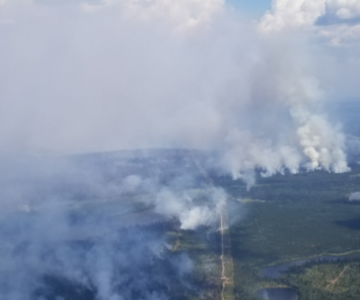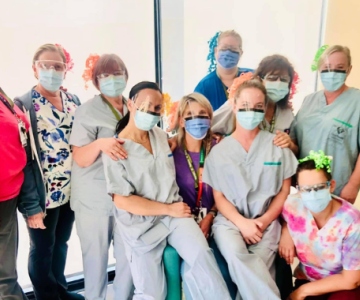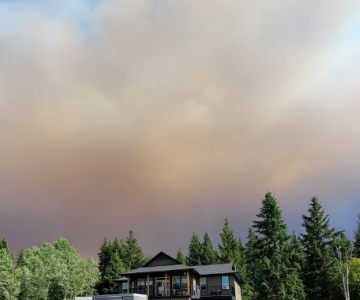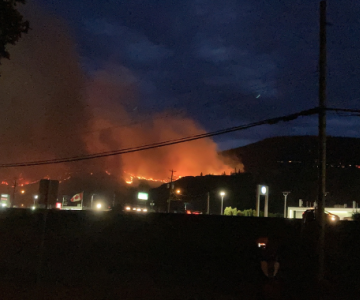Breadcrumb
Explore Stories
2 Minute Read
Community & Culture
Mother Nature is glorious but fickle – we never know what she is going to hand us.
Folks in the Chilcotin are known to be resourceful and resilient, but our mettle was significantly tested during the massive firestorm of 2017, when three major complexes - the Plateau, Hanceville and West Chilcotin - burned 8,193 square kilometres. During the 2021 fire season, this area was under threat again as two significant wildfires at Big Stick Lake and Hotnarko Creek kept people living along the Highway 20 corridor on high alert.
The West Chilcotin Health Centre is small, so we have to handle whatever walks through the door. The building has a generator that starts automatically when the power cuts to allow continuous care. We are equipped with radios to connect with the local Search and Rescue, various community repeater systems, a satellite phone and spot device with text-based communication, and a GPS location tied to our manager’s email should we need further emergency assistance. We stock bottled water and dry food along with a small warehouse of medical supplies in case our highway is shut down.
Wildfire in the Cariboo Regional District
During the 2017 wildfires, one of our biggest challenges was acquiring medications for patients while the highway was closed. Our nurse practitioner Patrice Gordon and I gathered information about what medications our patients needed; some patients are so remote they required visitation by horseback from Patrice. We called the prescriptions into a Shopper’s Drug Mart in Nanaimo and they flew the medications into Bella Coola, where the medications were picked up by the RCMP and driven to the clinic or the local manor, where I was assisting after hours making food for fire crews.
The thing that I always take away from any disaster is how important it is to be fluid: for our patients and for ourselves. We must keep adjusting to whatever changes are thrown at us each day. No two events will ever be the same. Being prepared is so very important but being able to adapt within that emergency will always be the biggest asset.
About the author
Lee Anne Wright provides administrative support as a health unit aide in Alexis Creek and Tatla Lake.
Natural Disaster Champions series
In 2021, the B.C. Interior region experienced a natural disaster season like none other. Interior Health staff stepped up and came together to support each other, patients, friends, family and communities. We’re sharing the stories of staff members reflecting on how being prepared – at home and at work – can make all the difference when minutes matter.
View more stories in the series
2 Minute Read
Community & Culture
Brookhaven's Chronic Behavioural Disorder unit staff celebrate a resident's 80th birthday while evacuated at Creekstone Manor in North Vancouver in August 2021.
In August 2021, the Brookhaven Care Centre team in West Kelowna came together in extraordinary measures to safely evacuate all 104 of their residents from the risk of wildfire.
Residents boarded a series of buses, then an airplane, to arrive at their destinations in Vancouver. Several staff accompanied the residents on the journey, a few working continuously for 24 hours to ensure everyone was safe and settled into their temporary homes. One dedicated health-care aide even slept on the floor of the nursing unit the first night, keeping close by in case his residents needed him.
Pam Gill, LPN (left) and Keegan Dufresne, Long-Term Care Aide
A number of team members continued to live on-site with the residents, while others travelled back and forth between the Interior and the coast for a number of weeks. The efforts staff put in to make the best of the experience were incredible. They took time to decorate the residents’ bedrooms with posters and comfort items, and even hosted an 80th birthday party and 60th wedding anniversary celebration. These staff gave all their love and attention to their residents while being separated from their own homes and families.
The staff who stayed behind were no less dedicated, taking great care in cleaning the site top to bottom and preparing everything for the happy return of their residents.
A triumphant return for Brookhaven Care Centre staff member Tana (top) and resident Mary.
“I am constantly inspired by the incredible team that we have at Brookhaven, and how much they genuinely care about their residents,” said Renee Gauthier, Manager, Clinical Operations.
“It is because of their compassion and dedication that our vulnerable seniors were kept safe from greater distress during this emergency situation. While there were bumps and lessons learned, the competence, collaboration and humour of this team was commendable at every step of the way. I am so very proud of them!”
Renee Gauthier, Manager, Clinical Operations, Brookhaven Care Centre is constantly inspired by the Brookhaven team.
Natural Disaster Champions series
In 2021, the B.C. Interior region experienced a natural disaster season like none other. Interior Health staff stepped up and came together to support each other, patients, friends, family and communities. We’re sharing the stories of staff members reflecting on how being prepared – at home and at work – can make all the difference when minutes matter.
View more stories in the series
3 Minute Read
Community & Culture
The White Rock Lake wildfire, located approximately 34 kilometres northwest of Vernon, ignited on July 13, 2021. For about two weeks, residents of Monte Lake, the Paxton Valley, Westwold and Falkland remained on high alert as this fire rumbled around, refusing to be suppressed.
Then on Aug. 5, sustained winds of 25 km/hr gusting to 40 km/hr from the southwest blew the fire rapidly to the northeast and east, impacting hydro and transportation infrastructure, and threatening communities. Multiple structures were lost in the Monte Lake area during the fire’s 15 km run.
Deb, administrative assistant and Pritchard resident, was working on Interior Health’s wildfire Incident Command when she heard the news and prepared for possible evacuation. Outside looking towards Paxton Valley, the sky was angry with brown and black plumes of smoke, the fire maybe 7 km away.
Having lived through the previous year’s wildfire season, Deb knew what it felt like to be on high alert. The proximity of the White Rock Lake wildfire was a trigger, which spurred Deb in to action to be exceptionally prepared:
She moved her horse one week before and relocated the travel trailer to an RV park for August
The horse trailer came home and on standby to move other boxes, hooked up to the truck with a full tank of gas
She placed a list by the phone of emergency phone numbers and itemized items to help with departure
Boxes including passports, photos and other important papers sat ready for loading, and headlamps were accessible next to containers for nighttime departure
An overnight bag was packed with necessities, including prescriptions
Dog kennels were placed in the vehicle with their food, collars and leashes
Propane tanks, other vehicles and equipment were moved to an open area out front
Sprinklers sat on the roof, ready to go with large water tanks and a generator pump
A note was prepared for the window: All livestock, pets and humans are safe and removed
A grab-and-go bag is a small emergency kit that's easy to take with you, in case you need to leave right away. It's a good idea to make grab-and-go bags for your home, workplace and vehicle. Learn what supplies you should include in a grab-and-go bag.
“Some thoughtful planning ahead of this difficult day helped to make leaving a bit easier,” said Deb. “Luckily, our home was spared from the beast – the fire was stopped by the fire guard about a kilometre away.”
Natural Disaster Champions series
In 2021, the B.C. Interior region experienced a natural disaster season like none other. Interior Health staff stepped up and came together to support each other, patients, friends, family and communities. We’re sharing the stories of staff members reflecting on how being prepared – at home and at work – can make all the difference when minutes matter.
View more stories in the series
2 Minute Read
Community & Culture
The Juniper Ridge neighbourhood of Kamloops when it caught fire in 2021
Canada Day is often celebrated around Canada with fireworks. In 2021, Mother Nature provided a light show in the form of a lightning storm for those living in the Juniper Ridge and Valleyview neighbourhoods of Kamloops.
A wooded area below the ridge appeared to have ignited from the lightning and fire quickly spread towards homes in Valleyview, leading to tactical evacuations of homes under threat and Kamloops Fire Rescue calling out every available firefighter to work.
Fortunately, no homes were lost during the incident, but for Karen Cooper (pictured below), Clinical Operations Director in the Thompson-Cariboo Shuswap area, and Juniper Ridge resident, it was a jolt into action.
Within minutes of the lightning strike, neighbours texted her to be ready to leave. Having been incident commander on the Lytton fire for her job at Interior Health just the day before, Karen had a “go bag” packed already, and had her son do the same. As such, they were able to act quickly and drive out the lone egress route before the congestion that followed.
“Driving down the long hill looking at the 50-foot walls of flames moving rapidly towards my home was terrifying, and yet hearing later of folks who crept down the hill, taking over two hours to get to safety, made me so grateful for the preparation done just hours earlier. I missed key items, such as my passport and some of my important papers, but I learned a lot and updated my “go bag” items accordingly. I didn’t unpack that bag until December, not wanting to let go of the potential need for it after such a long season of maintaining readiness.
“Lastly, I reached out immediately to my team for support through a group text. I was able to hand off being incident commander, and received many welcome words of encouragement from my peers. Knowing I had covered off my work, had a place to go and that my loved ones were safe was so critical to dealing with the immense stress of the situation.
“I cannot overstate the importance of having a plan, an egress route, a “go bag” and your circle of support people identified in advance of an emergency situation.”
Natural Disaster Champions series
In 2021, the B.C. Interior region experienced a natural disaster season like none other. Interior Health staff stepped up and came together to support each other, patients, friends, family and communities. We’re sharing the stories of staff members reflecting on how being prepared – at home and at work – can make all the difference when minutes matter.
View more stories in the series
2 Minute Read
Community & Culture
Often during an emergency, there are people who stand out as exceptional leaders. Michael-Ann Miller (pictured above), clinical operations manager in the South Okanagan (SOK), is one of them.
In the fall of 2021, the Tulameen River crested and flooded the town of Princeton in the SOK. During the flood, with roads and highways cut off due to water rising, Michael-Ann was the eyes and ears on the ground, supporting and coordinating emergency efforts. Homes were devastated, and water, gas and other utilities were impacted.
“I’m sure she did a lot more than I know about!” said Sarah Edwards, manager of the primary care network in the SOK. “Michael-Ann is a true superstar who cares greatly about her community and is passionate about providing access to safe and excellent health care in rural communities.”
Not only did Michael-Ann support and coordinate the move of patients from the hospital facilities in her care but also from Ridgewood Lodge long-term care facility, as its manager was on vacation at the time. Michael-Ann also fielded the strong emotions and stress coming from both staff and the community of Princeton. At the same time, she was also dealing with personal impacts of the flood, and caring for her family and elderly in-law extended family.
“Michael-Ann worked tirelessly to ensure everyone was evacuated safely, effectively and efficiently, and in a timely way,” said Jana Abetkoff, directory of primary care in the SOK. “She supported staff struggling to work in challenging conditions while managing their own personal impacts as well.
"The dedication she demonstrated was exemplary in this circumstance. We will forever be grateful for her professionalism, resilience, organization and commitment to staff, clients and her community."
Natural Disaster Champions series
In 2021, the B.C. Interior region experienced a natural disaster season like none other. Interior Health staff stepped up and came together to support each other, patients, friends, family and communities. We’re sharing the stories of staff members reflecting on how being prepared – at home and at work – can make all the difference when minutes matter.
View more stories in the series
-
Showing 5 of 5
STAY CONNECTED
Receive news and alert posts, and Stories@IH blog posts, right to your inbox!





